被动语态讲解与练习
被动语态讲解及练习(含答案)

被动语态讲解及练习(含答案)一、单项选择被动语态1.Please don’t stand up in class until you ______.A.were told to B.are toldC.are told to D.were told【答案】C【解析】【详解】考查省略句。
句意:直到有人叫你站起来,你才可以在课堂上站起来。
在一定的上下文中,为了避免重复,动词不定式在句中可以被省略掉,但是要保留动词不定式的符号to。
分析句子可知,本句为一般现在时。
故C选项正确。
【点睛】to代替不定式在一定的上下文中,为了避免重复,动词不定式在句中可以被省略掉,但是要保留动词不定式的符号to。
to代替不定式,常同refuse, want, seem, intend, expect, hope, like, be afraid, prefer, care, oblige, forget, wish, try,tell等动词连用。
注意:如果不定式中含有be, have,或have been,一般要保留be, have或have been。
本句还原为:Please don’t stand up in class until you are told to stand up。
省略句为:Please don’t stand up in class until you are told to 。
故C选项正确。
2. A human case of H7N9 was reported in 2014 when a woman______ to be infected with the bird flu virus.A.confirmed B.had been confirmedC.was confirmed D.have confirmed【答案】C【解析】试题分析:句意:一例人感染H7N9病毒的报告发生在2014年,当时,一名女性被确诊感染了禽流感。
高中英语被动语态讲解及练习(含答案)
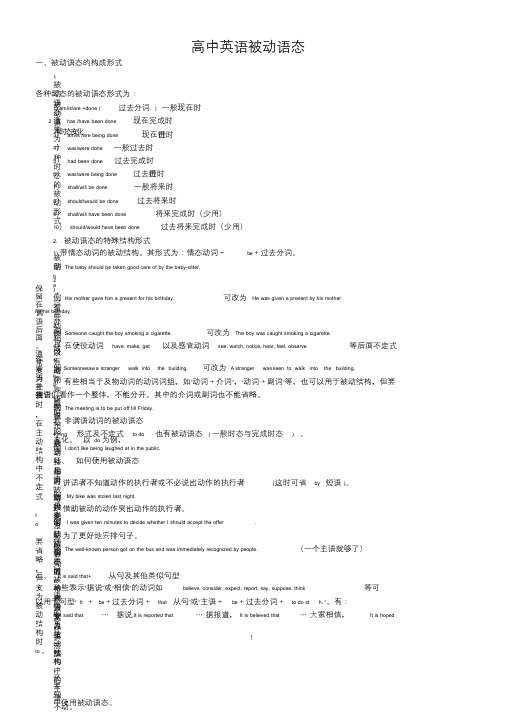
例The glass is broken.(系表结构)
The glass was broken by the boy.(被动语态)
2.如果句中有地点、频率或时间状语时,一般为被动语态。
7.“outof+名词”结构;表示“超出⋯⋯之外“,常见的有:out of control (控制不了),out of sight(超
出视线之外),out of one’s reach够(不着), out of fashion(不流行)等。
例The plane was out of control (can’t be controlled.)。
据建议。
例It is said that the boy has passed the national exam.(=The boy is said to have passed the
national exam.)
四、谓语动词的主动形式表示被动意义
1.英语中有很多动词如break,catch,clean,drive,lock,open,sell,read,write,wash等,当它
10)should/would have been done过去将来完成时(少用)
2.被动语态的特殊结构形式
1)带情态动词的被动结构。其形式为:情态动词+be+过去分词。
例The baby should be taken good care of by the baby-sitter.
2)有些动词可以有两个宾语,在用于被动结构时,可以把主动结构中的一个宾语变为主语,另一宾语仍然
6.在therebe⋯句型中,当动词不定式修饰名词作定语时,不定式用主动式作定语,重点在人,用被动形
(完整word版)被动语态讲解及练习题
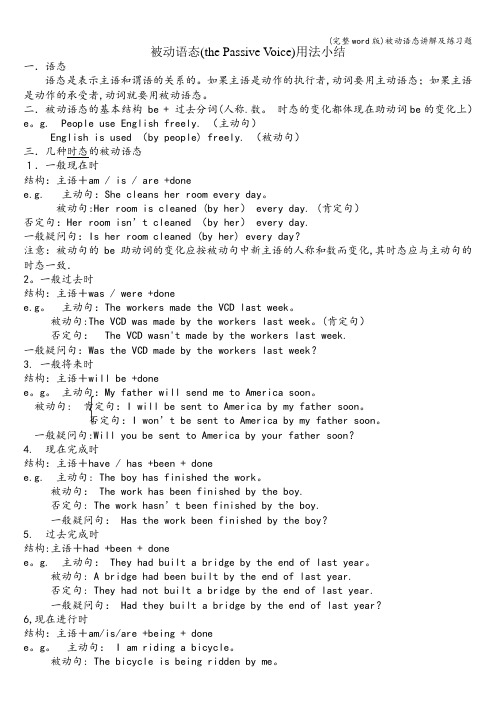
被动语态(the Passive V oice)用法小结一.语态语态是表示主语和谓语的关系的。
如果主语是动作的执行者,动词要用主动语态;如果主语是动作的承受者,动词就要用被动语态。
二.被动语态的基本结构 be + 过去分词(人称.数。
时态的变化都体现在助动词be的变化上)e。
g. People use English freely. (主动句)English is used (by people) freely. (被动句)三.几种时态的被动语态1.一般现在时结构:主语+am / is / are +donee.g. 主动句:She cleans her room every day。
被动句:Her room is cleaned (by her) every day. (肯定句)否定句:Her room isn’t cleaned (by her) every day.一般疑问句:Is her room cleaned (by her) every day?注意:被动句的be助动词的变化应按被动句中新主语的人称和数而变化,其时态应与主动句的时态一致.2。
一般过去时结构:主语+was / were +donee.g。
主动句:The workers made the VCD last week。
被动句:The VCD was made by the workers last week。
(肯定句)否定句: The VCD wasn't made by the workers last week.一般疑问句:Was the VCD made by the workers last week?3. 一般将来时结构:主语+will be +donee。
g。
主动句:My father will send me to America soon。
被动句: 肯定句:I will be sent to America by my father soon。
被动语态讲解及练习(含答案)

被动语态讲解及练习(含答案)一、单项选择被动语态1.More than one worker ______ dismissed.A.have been B.areC.has been D.has【答案】C【解析】【详解】考查主谓一致和语态。
句意:不止一个工人被解雇了。
如果主语由"many a,more than one +单数名词"构成,尽管从意义上看是复数,但谓语动词仍用单数形式,故排除A和B,“工人”和“解雇”之间是被动关系,用被动语态,故选C。
2.—Are we about to having dinner?—Yes, it ________ in the dining room.A.serve B.is servingC.is being served D.has been serving【答案】C【解析】考查时态和语态。
句意:——我们准备去吃饭吗?——是的,饭菜正在餐厅被供应。
it是指饭菜,和动作serve之间是被动关系,且动作正在进行,四个选项中只有C项是现在进行时的被动语态,故选C。
3.(桂林部分学校高三质量检测)The wet weather will continue tomorrow,when a coldfront________to arrive.A.will be expected B.is expectingC.expects D.is expected【答案】D【解析】考查动词的时态和语态。
句意为:预计将有一股冷锋到来,因此潮湿的天气明天将会继续。
a cold front与expect之间是逻辑上的动宾关系,expect是发生在现在的动作,要用一般现在时,故选D项。
答案:D4.The affairs of each country should be by its own people.A.elected B.settledC.developed D.contained【答案】B【解析】考查动词。
【英语】被动语态讲解及练习(含答案)
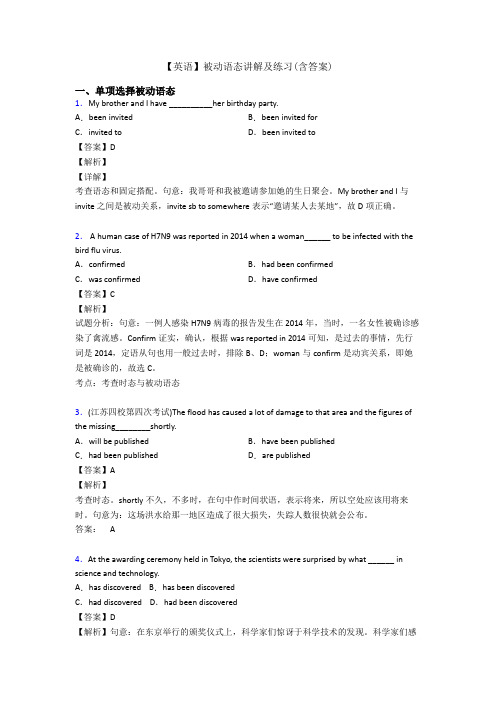
【英语】被动语态讲解及练习(含答案)一、单项选择被动语态1.My brother and I have __________her birthday party.A.been invited B.been invited forC.invited to D.been invited to【答案】D【解析】【详解】考查语态和固定搭配。
句意:我哥哥和我被邀请参加她的生日聚会。
My brother and I与invite之间是被动关系,invite sb to somewhere表示“邀请某人去某地”,故D项正确。
2. A human case of H7N9 was reported in 2014 when a woman______ to be infected with the bird flu virus.A.confirmed B.had been confirmedC.was confirmed D.have confirmed【答案】C【解析】试题分析:句意:一例人感染H7N9病毒的报告发生在2014年,当时,一名女性被确诊感染了禽流感。
Confirm证实,确认,根据was reported in 2014可知,是过去的事情,先行词是2014,定语从句也用一般过去时,排除B、D;woman与confirm是动宾关系,即她是被确诊的,故选C。
考点:考查时态与被动语态3.(江苏四校第四次考试)The flood has caused a lot of damage to that area and the figures of the missing________shortly.A.will be published B.have been publishedC.had been published D.are published【答案】A【解析】考查时态。
shortly不久,不多时,在句中作时间状语,表示将来,所以空处应该用将来时。
(完整版)被动语态讲解及练习(附答案)

(完整版)被动语态讲解及练习(附答案)被动语态讲解一、被动语态的构成形式1. 被动语态的基本时态变化被动语态通常为十种时态的被动形式, 被动语态由be+过去分词构成,be随时态的变化而变化。
以do为例,各种时态的被动语态形式为:1) am/is/are +done (过去分词) 一般现在时例Visitors are requested not to touch the exhibits.2)has /have been done 现在完成时例All the preparations for the task have been completed, and we're ready to start.3)am/is /are being done 现在进行时例A new cinema is being built here.4)was/were done 一般过去时例I was given ten minutes to decide whether I should reject the offer.5)had been done 过去完成时例By the end of last year, another new gymnasium had been completed in Beijing.6)was/were being done 过去进行时例A meeting was being held when I was there.7)shall/will be done 一般将来时例Hundreds of jobs will be lost if the factory closes.8)should/would be done 过去将来时例The news would be sent to the soldier's mother as soon as it arrived.9)shall/will have been done 将来完成时(少用)例The project will have been completed before July.2. 被动语态的特殊结构形式1)带情态动词的被动结构。
被动语态讲解及练习(含答案)
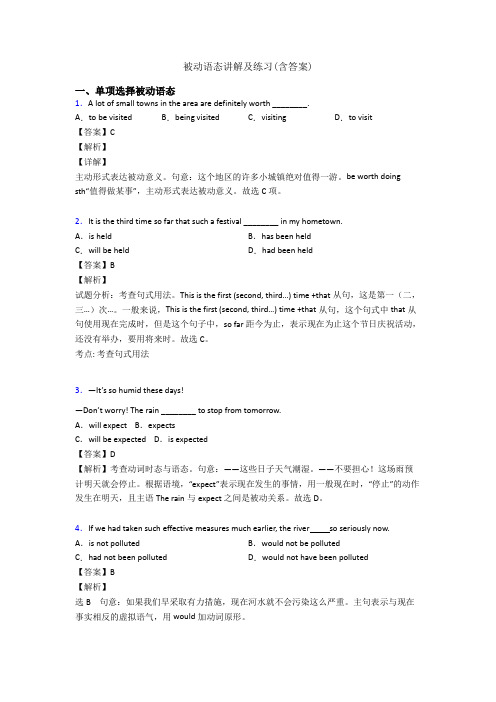
被动语态讲解及练习(含答案)一、单项选择被动语态1.A lot of small towns in the area are definitely worth ________.A.to be visited B.being visited C.visiting D.to visit【答案】C【解析】【详解】主动形式表达被动意义。
句意:这个地区的许多小城镇绝对值得一游。
be worth doingsth“值得做某事”,主动形式表达被动意义。
故选C项。
2.It is the third time so far that such a festival ________ in my hometown.A.is held B.has been heldC.will be held D.had been held【答案】B【解析】试题分析:考查句式用法。
This is the first (second, third…) time +that从句,这是第一(二,三…)次…。
一般来说,This is the first (second, third…) time +that从句,这个句式中that从句使用现在完成时,但是这个句子中,so far距今为止,表示现在为止这个节日庆祝活动,还没有举办,要用将来时。
故选C。
考点: 考查句式用法3.—It’s so humid these days!—Don’t worry! The rain ________ to stop from tomorrow.A.will expect B.expectsC.will be expected D.is expected【答案】D【解析】考查动词时态与语态。
句意:——这些日子天气潮湿。
——不要担心!这场雨预计明天就会停止。
根据语境,“expect”表示现在发生的事情,用一般现在时,“停止”的动作发生在明天,且主语The rain与expect之间是被动关系。
被动语态讲解和练习

5、主动语态变被动语态应注意的问题 、 1.把主动语态变为被动语态时,应保留主动语态原来 把主动语态变为被动语态时, 把主动语态变为被动语态时 的时态。 的时态。如:She often cleans the house. The house is often cleaned by her. 2.有些动词可以有双宾语,在用于被动结构时, 有些动词可以有双宾语,在用于被动结构时, 有些动词可以有双宾语 通常变为主语的是间接宾语( ) 通常变为主语的是间接宾语(sb.) His mother gave him a present for his birthday He was given a present by his mother for his birthday.
课堂练习 (一)改写句子 1. We plant trees in spring every year. Trees are planted _________________ by us in spring every year. 2. She posted the letter yesterday. The letter was posted ____________________ by her yesterday. 3. Mr Turner gave me a birthday present. I was given _______________a birthday present by Mr Turner. 4. He is drawing a picture. A picture is being drawn _______________________ by him. 5. You may hand in your homework tomorrow. Your homework may be handed in ______________________________ by you tomorrow. 6. She is going to write a letter. __________________________ by her. A letter is going to be written
被动语态讲解及练习(附答案)

被动语态讲解及练习一、主动语态与被动语态的概念:例:⑴We listen to the teacher carefully in class.主谓宾→The teacher is listened to by us carefully in class.主谓介词短语⑵We laughed at him .→He was laughed at by us.二:时态动词的被动形式例句一般现在时is done He is asked to do this.一般过去时was done The story was told by her mother.一般将来时will be done The problem will be discussed tomorrow. 现在进行时is being done The novel is being written.过去进行时was being done At that time the desk was being made.现在完成时has been done The house has been built.过去完成时had been done They said that their work had been finished. 过去将来时would be done He said the trees would be planted soon.三、被动语态的各种句型:1、The song is liked by young people. (肯定句)2、The song isn’t liked by young people(否定句)3、Is the song liked by young people ?(一般疑问句)4、Who is the song liked by ?=By whom is the song liked?(特殊疑问句)四、主动语态改被动语态的方法:方法分为三步:⑴把原句中的宾语改成主语⑵动词改为变动形式be done(同时注意时态)⑶原来的主语如果需要的话放在介词by后面,以指明做事的人或物,如果没有必要则省去例:The man killed a tiger.→A tiger was killed by the man .(改的过程中要注意时态和语态两个方面)五、特殊句型的被动语态:1 含有使役动词(make /let /have)或感官动词(hear ,see, listen to ,look at ,find ,watch,feel 等)的句子,在主动语态中这些词后常跟不带to的动词不定式,但是在改成被动语态时,则一定要把省去的to再加上去,另外help这一个词在主动语态中后面的动词不定式可以带to,也可不带to, 但在被动语态中也必须把to加上去。
初中中考英语语法被动语态的讲解-专项练习及参考答案
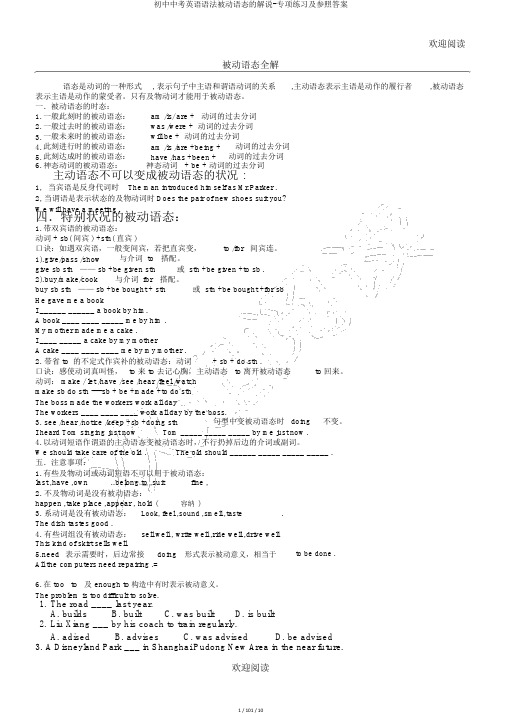
欢迎阅读被动语态全解语态是动词的一种形式 , 表示句子中主语和谓语动词的关系 ,主动语态表示主语是动作的履行者,被动语态表示主语是动作的蒙受者。
只有及物动词才能用于被动语态。
一.被动语态的时态:1. 一般此刻时的被动语态: am /is/ are + 动词的过去分词2. 一般过去时的被动语态: was /were + 动词的过去分词3. 一般未来时的被动语态: will be + 动词的过去分词4. 此刻进行时的被动语态: am /is /are +being + 动词的过去分词5. 此刻达成时的被动语态: have /has +been + 动词的过去分词6. 神态动词的被动语态: 神态动词 + be + 动词的过去分词主动语态不可以变成被动语态的状况 :1, 当宾语是反身代词时 The man introduced himself as Mr.Parker . 2, 当谓语是表示状态的及物动词时Does the pair of new shoes suit you? We will have a meeting .四.特别状况的被动语态:1. 带双宾语的被动语态: 动词 + sb( 间宾 ) +sth( 直宾 )口诀:如遇双宾语,一般变间宾,若把直宾变, to /for 间宾连。
1).give/pass /show 与介词 to 搭配。
give sb sth —— sb +be given sth 或 sth +be given +to sb .2).buy/make/cook 与介词 for 搭配。
buy sb sth —— sb +be bought + sth 或 sth +be bought +for sb He gave me a book I ______ ______ a book by him. A book ____ ____ _____ me by him . My mother made me a cake . I ____ _____ a cake by my mother A cake ____ ____ ____ me by my mother . 2. 带省 to 的不定式作宾补的被动语态:动词 + sb + do sth . 口诀:感使动词真叫怪, to 来 to 去记心胸,主动语态 to 离开被动语态 to 回来。
被动语态的讲解_专项练习及参考答案
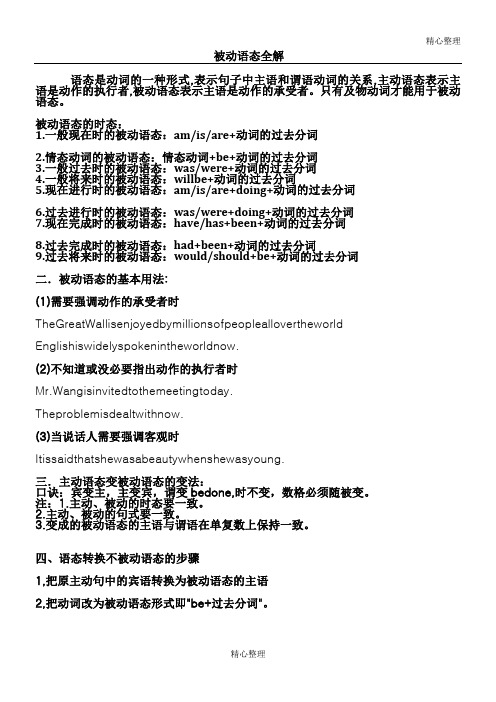
精心整理被动语态全解语态是动词的一种形式,表示句子中主语和谓语动词的关系,主动语态表示主语是动作的执行者,被动语态表示主语是动作的承受者。
只有及物动词才能用于被动语态。
被动语态的时态:1.一般现在时的被动语态:am/is/are+动词的过去分词2.情态动词的被动语态:情态动词+be+动词的过去分词3.一般过去时的被动语态:was/were+动词的过去分词4.一般将来时的被动语态:willbe+动词的过去分词5.现在进行时的被动语态:am/is/are+doing+动词的过去分词6.过去进行时的被动语态:was/were+doing+动词的过去分词7.现在完成时的被动语态:have/has+been+动词的过去分词8.过去完成时的被动语态:had+been+动词的过去分词9.过去将来时的被动语态:would/should+be+动词的过去分词二.被动语态的基本用法:(1)需要强调动作的承受者时TheGreatWallisenjoyedbymillionsofpeopleallovertheworldEnglishiswidelyspokenintheworldnow.(2)不知道或没必要指出动作的执行者时Mr.Wangisinvitedtothemeetingtoday.Theproblemisdealtwithnow.(3)当说话人需要强调客观时Itissaidthatshewasabeautywhenshewasyoung.三.主动语态变被动语态的变法:口诀:宾变主,主变宾,谓变bedone,时不变,数格必须随被变。
注:1.主动、被动的时态要一致。
2.主动、被动的句式要一致。
3.变成的被动语态的主语与谓语在单复数上保持一致。
四、语态转换不被动语态的步骤1,把原主动句中的宾语转换为被动语态的主语2,把动词改为被动语态形式即"be+过去分词"。
3,原来主动语态句子中的主语,如果需要就放在by的后面以它的宾格形式出现(因为by是介词,后面需跟宾格作介词的宾语。
7被动语态讲解+练习+答案
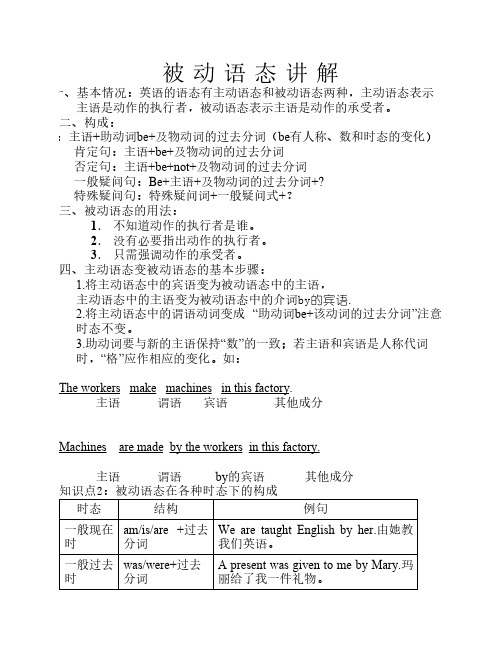
宾补变主补” I asked him to help me with my English. →He was asked to help me with my English.
注意:感觉动词和使役动词在主动句中其后的动词不定式不带to,但变 被动句时to必须还原。
被动语态讲解
一、基本情况:英语的语态有主动语态和被动语态两种,主动语态表示 主语是动作的执行者,被动语态表示主语是动作的承受者。
二、构成: 陈述句:主语+助动词be+及物动词的过去分词(be有人称、数和时态的变化)
肯定句:主语+be+及物动词的过去分词 否定句:主语+be+not+及物动词的过去分词 一般疑问句:Be+主语+及物动词的过去分词+? 特殊疑问句:特殊疑问词+一般疑问式+? 三、被动语态的用法:
The pen costs five yuan. Cold weather lasts long. This kind of dictionary sells well. 3. 当宾语和谓语是一个不可分割的整体时。
We had a swim in the river yesterday. The teacher walked into the classroom. 4. 当宾语为动词不定式或Ving时。
A. is going to discuss B. will discuss
C. is going to be discussed D. has been discussed
6. The lab ____ about five years ago.
被动语态讲解及练习含答案

被动语态讲解及练习(含答案)一、单项选择被动语态1. ___________________________________________________ Many subway stations, including the one near our school, __________________________________ at present for a better tran sport in the city.A.are con struct ing B . are being con structed C. is con struct ing D . is being con structed 【答案】B【解析】【详解】考查动词时态语态。
句意:许多地铁站,包括我们学校附近的地铁站,目前正在建设中,以便有更便利的交通。
此处表示动作正在进行,句中主语Many subway stations和动词con struct是被动关系,所以此处用现在进行时的被动,与主语一致,故选 B.【点睛】现在进行时的被动结构:be + bei ng+过去分词A number of Dongfeng trucks are being shipped abroad. 一批东风卡车正被运往国外。
1)“ be being done中的动词be应随主语作相应的变化。
2)将现在进行时的主动语态变为现在进行时的被动语态的关键是:把be doing变为be being done.例1. The stude nts are clea ning the classroom now. The classroom is being clea ned now. 现在学生们正在打扫教室。
(are cleaning变为is being cleaned)例2. The boy is counting some sheep. Some sheep are being counted.那男孩正在数羊。
被动语态讲解及练习
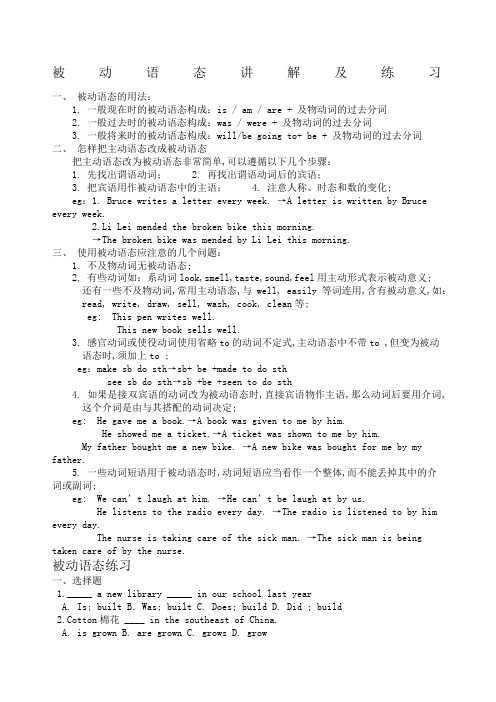
被动语态讲解及练习一、被动语态的用法:1. 一般现在时的被动语态构成:is / am / are + 及物动词的过去分词2. 一般过去时的被动语态构成:was / were + 及物动词的过去分词3. 一般将来时的被动语态构成:will/be going to+ be + 及物动词的过去分词二、怎样把主动语态改成被动语态把主动语态改为被动语态非常简单,可以遵循以下几个步骤:1. 先找出谓语动词;2. 再找出谓语动词后的宾语;3. 把宾语用作被动语态中的主语;4. 注意人称、时态和数的变化;eg:1. Bruce writes a letter every week. →A letter is written by Bruce every week.2.Li Lei mended the broken bike this morning.→The broken bike was mended by Li Lei this morning.三、使用被动语态应注意的几个问题:1. 不及物动词无被动语态;2. 有些动词如:系动词look,smell,taste,sound,feel用主动形式表示被动意义;还有一些不及物动词,常用主动语态,与well, easily等词连用,含有被动意义,如:read, write, draw, sell, wash, cook, clean等;eg: This pen writes well.This new book sells well.3. 感官动词或使役动词使用省略to的动词不定式,主动语态中不带to ,但变为被动语态时,须加上to ;eg:make sb do sth→sb+ be +made to do sthsee sb do sth→sb +be +seen to do sth4. 如果是接双宾语的动词改为被动语态时,直接宾语物作主语,那么动词后要用介词,这个介词是由与其搭配的动词决定;eg: He gave me a book.→A book was given to me by him.He showed me a ti cket.→A ticket was shown to me by him.My father bought me a new bike. →A new bike was bought for me by my father.5. 一些动词短语用于被动语态时,动词短语应当看作一个整体,而不能丢掉其中的介词或副词;eg: We can’t laugh at him. →He can’t be laugh at by us.He listens to the radio every day. →The radio is listened to by him every day.The nurse is taking care of the sick man. →The sick man is being taken care of by the nurse.被动语态练习一、选择题1._____ a new library _____ in our school last yearA. Is; builtB. Was; builtC. Does; buildD. Did ; build2.Cotton棉花 ____ in the southeast of China.A. is grownB. are grownC. growsD. grow3.A talk on Chinese history _____ in the school hall next week.A. is givenB. has been givenC. will be givenD. gives4.How many trees ____ this yearA. are plantedB. will plantC. have been plantedD. planted5.A lot of things ____ by people to save the little girl now.A. are doingB. are being doneC. has been doneD. will be done6.--When ___ this kind of computers______ --Last year.A. did; useB. was; usedC. is; usedD. are; used7.The Great Wall ____ all over the world.A. knowsB. knewC. is knownD. was known8.Who _____ this book _____A. did; writtenB. was; written byC. did; writtenD. was; written9.A story _____ by Granny yesterday.A. was told usB. was told to usC. is told usD. told us10.The monkey was seen _____ off the tree.A. jumpB. jumpsC. jumpedD. to jump二、用括号内所给动词的正确形式填空;1.It's said据说 that the long bridge______________buildin two months.2.Where to have the meeting ______________ discussnow.3.Which language _______the most widely_______speakin the worldst year a large number of trees______________cutdown.5. The students _____ often _____tell to take care of their desks and chairs.6. Vegetables, eggs and fruits_________ sell in this shop.7. What _______ knives ______ make ofThey_______________make of metal金属 and wood.8. Can the magazine ________ take out of the library9. The room _____________ clean by me every day.10. Some flowers _______________ water by Li Ming already.11. This kind of shoes __________ sell well.12.The food _____________ smell delicious.13. Look Someone __________dance.三、按要求改写下列句子,一空一词;1.Is tea grown in South China改为主动语态_______ people _________ tea in South China2.I am given a birthday present by my parents every year.同义句转换A birthday present _______ _______ _______ _______by my parents every year.3.The work is going to be finished in two days. 对划线提问How_______ _______ the work going to be finished4. The children will sing an English song. 改为被动语态An English song ______ ______ _______ by the children.5. People use metal for making machines. 改为被动语态Metal ________ _________ _______making machines.6. He made me do that for him. 改为被动语态I ______ ________ ________ ______ that for him.7.They are watching the football match.The football match _______ _______ _______ by them.8.Did they build a bridge here a year ago 改为被动语态__________ a bridge ____________ here by them a year ago 9.We call the game “Lianliankan”. 改为被动语态The game _______ ________ “Lianliankan” by us.。
英语被动语态讲解及练习

英语被动语态讲解及练习英语被动语态讲解及练习一、什么是被动语态,英语中语态有两种,即:主动语态和被动语态。
所谓“被动语态”,相当于中文中常说的“被……”、“由……”的句式,如:“他的自行车被偷了。
”,“这座楼房是由他们建造的。
” 二、被动语态的结构请看下面的例句(注意划线部分): His bicycle was stolen. The building has been built in 2000.总结:被动语态”的构成是:be + 过去分词 + (by+动作执行者 )三、各种时态的被动语态:一般地讲,被动语态可用于英语的各种时态。
重点是要掌握be动词的各种时态变化。
1、一般现在时: am / is / are + 动词的过去分词Our classroom is cleaned every day. This car is made in China.2、一般过去式: was / were + 动词的过去分词His desk was cleaned just now. The station was built in 1928.3、现在进行时: am / is / are + being + 动词的过去分词A new factory is being built in our city now. Some trees are being cut down in the park.4、过去进行时: was / were + being + 动词的过去分词A new factory was being built in our city at that time.Some babies were being looke afterd by Miss Chen last year.5、一般将来时:(A) will / shall + be + 动词的过去分词 (B) am / is / are + going to be +动词的过去分词 .Some new factories will be built in our city this year. Your watchis going to be mende in an hour. d6、过去将来时:(1).would / should + be + 动词的过去分词 (2).was / were +going to be + 动词的过去分词.She said that some new factories would be built soon in our city.He thought that your watch was going to be mende afterd an hour.7、现在完成时:have / has + been + 动词的过去分词Some new factories have been built in the city since last year. Your watch has been mended already.8、过去完成时:had + been + 动词的过去分词He said that some new factories had been built in the city.Ididn’tknowthatmywatch had been mended .9、含情态动词的被动式:can/may/must + be + 动词的过去分词He can not be found. / I must be paid for this.四、如何将主动语态变成被动语态1、从句子意义上说,就是重新找出“什么事物”是“被完成”的。
初中英语被动语态讲解、练习题及答案
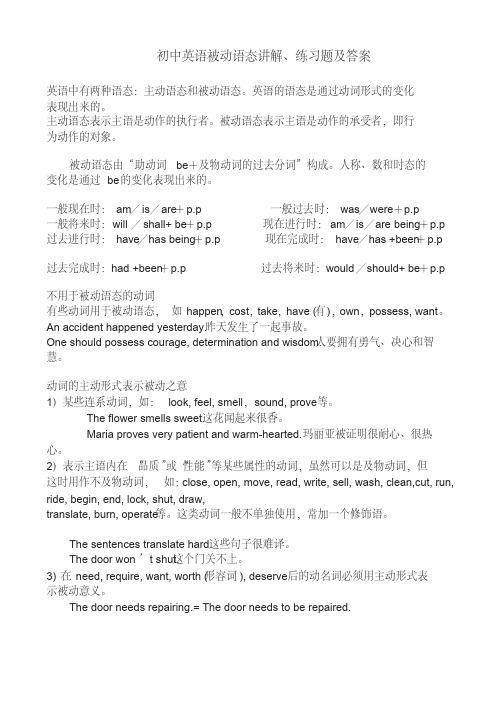
初中英语被动语态讲解、练习题及答案英语中有两种语态:主动语态和被动语态。
英语的语态是通过动词形式的变化表现出来的。
主动语态表示主语是动作的执行者。
被动语态表示主语是动作的承受者,即行为动作的对象。
被动语态由“助动词be+及物动词的过去分词”构成。
人称、数和时态的变化是通过be的变化表现出来的。
一般现在时:am/is/are+p.p一般过去时:was/were+p.p一般将来时:will/shall+ be+p.p现在进行时:am/is/are being+p.p 过去进行时:have/has being+p.p现在完成时:have/has +been+p.p过去完成时:had +been+p.p过去将来时:would/should+ be+p.p不用于被动语态的动词有些动词用于被动语态,如happen,cost,take,have (有),own,possess, want 。
An accident happened yesterday. 昨天发生了一起事故。
One should possess courage, determination and wisdom. 人要拥有勇气、决心和智慧。
动词的主动形式表示被动之意1)某些连系动词,如:look, feel, smell,sound, prove等。
The flower smells sweet.这花闻起来很香。
Maria proves very patient and warm-hearted. 玛丽亚被证明很耐心、很热心。
2)表示主语内在“品质”或“性能”等某些属性的动词,虽然可以是及物动词,但这时用作不及物动词,如:close, open, move, read, write, sell, wash, clean,cut, run, ride, begin, end, lock, shut, draw,translate, burn, operate等。
被动语态讲解及练习
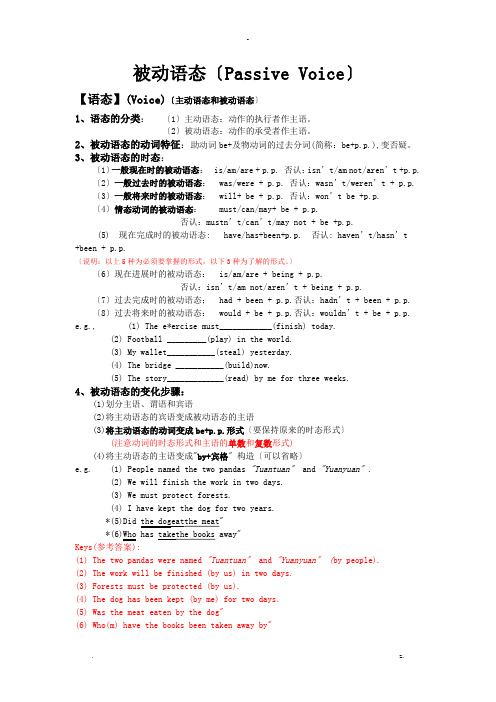
被动语态〔Passive Voice〕【语态】(Voice)〔主动语态和被动语态〕1、语态的分类:〔1〕主动语态:动作的执行者作主语。
〔2〕被动语态:动作的承受者作主语。
2、被动语态的动词特征:助动词be+及物动词的过去分词(简称:be+p.p.),变否疑。
3、被动语态的时态:〔1〕一般现在时的被动语态: is/am/are + p.p. 否认:isn’t/am not/aren’t +p.p.〔2〕一般过去时的被动语态: was/were + p.p. 否认:wasn’t/weren’t + p.p.〔3〕一般将来时的被动语态: will+ be + p.p. 否认:won’t be +p.p.〔4〕情态动词的被动语态: must/can/may+ be + p.p.否认:mustn’t/can’t/may not + be +p.p.(5) 现在完成时的被动语态: have/has+been+p.p. 否认: haven’t/hasn’t+been + p.p.〔说明:以上5种为必须要掌握的形式,以下3种为了解的形式。
〕〔6〕现在进展时的被动语态: is/am/are + being + p.p.否认:isn’t/am not/aren’t + being + p.p.〔7〕过去完成时的被动语态; had + been + p.p.否认:hadn’t + been + p.p.〔8〕过去将来时的被动语态: would + be + p.p.否认:wouldn’t + be + p.p.e.g., (1) The e*ercise must____________(finish) today.(2) Football _________(play) in the world.(3) My wallet___________(steal) yesterday.(4) The bridge ___________(build)now.(5) The story_____________(read) by me for three weeks.4、被动语态的变化步骤:(1)划分主语、谓语和宾语(2)将主动语态的宾语变成被动语态的主语(3)将主动语态的动词变成be+p.p.形式〔要保持原来的时态形式〕(注意动词的时态形式和主语的单数和复数形式)(4)将主动语态的主语变成"by+宾格〞构造〔可以省略〕e.g. (1) People named the two pandas "Tuantuan〞 and "Yuanyuan〞.(2) We will finish the work in two days.(3) We must protect forests.(4) I have kept the dog for two years.*(5)Did the dogeatthe meat"*(6)Who has takethe books away"Keys(参考答案):(1) The two pandas were named "Tuantuan〞 and "Yuanyuan〞 (by people).(2) The work will be finished (by us) in two days.(3) Forests must be protected (by us).(4) The dog has been kept (by me) for two days.(5) Was the meat eaten by the dog"(6) Who(m) have the books been taken away by"5、不用被动语态动词:〔1〕have 有〔2〕look,sound,smell,taste等连系动词〔3〕take place /happen〔4〕get to/arrive(at/in)/reach到达〔5〕rise升起,上升〔6〕ring(铃响)〔7〕begin/start开场〔8〕lie躺※The book sells well.(这本卖得好)※The meat cooks well.〔8〕return(回来,回归—不用被动,归还—可用被动语态)〔9〕leave(离开—不用被动语态,留下/遗忘—可用被动语态)e.g. (1)The idea ________(sound) great. Let’s go together.(2)The story _________(happen) in USA ten years ago.(3)The Olympics__________(take place) in Beijing in 2008.(4)The kind of bicycle______(sell) well.Keys(参考答案):(1)sounds (2)happened (3)took place (4)sells6、常用被动语态:〔1〕be located in (2)be covered with(3)be called〔4〕be made of(in/from)(5)be made up of (6)be asked to do sth(7)be invited to do sth(8)be used for doing sth/to do sthe.g. (1)The streets _________(cover) with snow because it__________(snow)heavily last night.(2)We________(tell) to e to school yesterday.(3)Many friends ________(invite) to my birthday part because it is mybirthday tomorrow.Keys(参考答案):(1)was covered, snowed (2) were told (3) were invited7、动词不定式的省to形式的被动语态:〔变被动时,要复原to〕※make sb do sth—be made to do sth〕※see sb do sth/watch sb do sth/hear sb do sth/notice sb do sthe.g. (1) Floods made people leave their home.(被动语态)(2) Teachers made us__________in the classroom, so we were made _______our homework.A. stay, doB.to stay, doC.to stay, to doD.stay, to doKeys(参考答案):(1)People were made to leave their home (by floods).(2) D8、动词后面跟双宾语:( 人在物前不用介词,物在人前要用介词to或for) –只需将其中的一个宾语〔要么人,要么物〕变成被动语态的主语注意:make/buy/draw常与for连用 e.g. make sth for sb/buy sth for sbe.g. (1)Uncle Li gave us a big dinner yesterday.We ______ ______ a big dinner ______ Uncle Li yesterday.A big dinner________ ________ _______us _____Uncle Li yesterday.(2)Dad will buy me a present.I ______ ______ ______ a present ______ Dad.A present ______ ______ ______ ______ me ______ Dad.Keys(参考答案):(1)were given, by ; was given to, by(2)will be bought, by ; will be bought for, by9、"动词+副词〞或"动词+介词"构造在变成被动语态后,介词或副词不能漏掉e.g. (1)We must look after our eyes.(2)How did you deal with the dog"Keys(参考答案):(1)Our eyes must be looked after by us.(2)How was the dog dealt with by you"10、同步练习被动语态练习I. 选择最正确答案:( ) 1. English __________ in Britain.A. speaksB. are spokenC. is speakingD. is spoken( ) 2. This popular song__________ by us after class.A. often singsB. often sangC. is often sangD. is often sung ( ) 3. This kind of bike __________ in Germany.A. makesB. madeC. is makingD. is made() 4. New puters _________ in our school.A. is usedB. are usingC. are usedD. have used( ) 5. Our flat must ___________ clean.A. keepB. be keptC. to be keptD. to keep( ) 6. A new hospital _____________ at the corner of the street.A. is buildingB. is being builtC. been builtD. be building ( ) 7. The key __________ on the sofa when I left.A. was leftB. will be leftC. is leftD. has been left( ) 8.Doctors ____________ all over the world.A. needB. are needingC. are neededD. will need( ) 9. His new book_____________ ne*t year.A. will be publishedB. is publishingC. is being publishedD. has been published( ) 10.French ____________ in every country.A. is not spokenB. are spokenC. is speakingD. is not speaking ( ) 11. These papers_____________yet.A. have not writtenB. have not been writtenC. has not writtenD. has not been written( ) 12. The sports meeting ____________ be held until ne*t week.A. didn'tB. won'tC. isn'tD. doesn't( ) 14.The two panda were taken to Taiwan ______________ us.A. forB. inC. toD. by() 15.The book ______________.A. sells goodB. sells wellC. is sold goodD. is sold well( ) 16. The broken bike_____________ here by Old Wang.A. can repairB. can be repairedC. can be repairingD. can repairing ( ) 17. The jar __________ for ___________ hot water.A. used; keepingB. was used; keepingC. is used; to keepD. are used; keep( ) 18.Cotton _____________ in the southeast of China.A. growsB. is grownC. were grownD. will grow( ) 19. The bridges__________ a few years ago.A. is builtB. builtC. were builtD. was built( ) 20.These babies__________in the hospital.A. are taken good careB. are taken good care ofC. take good care ofD. take good care( ) 21. These bridges __________stone.A. are made ofB. made ofC. are made intoD. made into( ) 22. These books__________ by the writer in the 1980s.A. are writtenB. were writtenC. are writingD. were writingII.用所给动词的适当时态和语态填空。
中学历史历史被动语态讲解及练习

中学历史历史被动语态讲解及练习中学历史被动语态讲解及练被动语态是英语中的一种常用语态,用于强调动作的接受者而非执行者。
在中学历史课程中,被动语态也常常被使用。
本文将对中学历史被动语态进行讲解,并提供相关练。
一、被动语态的基本构成被动语态的基本构成由“助动词be + 及物动词的过去分词形式”组成。
助动词be的形式随主语的人称和数而变化,在过去式中通常改变为was或were,而在进行时态中改变为am、is和are。
过去分词形式则根据不同动词的规则进行变化。
例如:- 主动语态:The teacher teaches history.- 被动语态:History is taught by the teacher.二、被动语态的用途被动语态在历史学科中的使用广泛,常用于以下情况:- 强调历史事件的受益者或受害者。
- 说明历史中的社会结构和权力关系。
- 描述历史中的重要决策和事件。
三、被动语态的练以下是一些练,帮助加深对被动语态的理解和运用:1. Rewrite the following sentence in the passive voice:The Roman Empire conquered many territories.Answer: Many territories were conquered by the Roman Empire.2. Change the given sentence to the passive voice:The World War II ended in 1945.Answer: The World War II was ended in 1945.The Declaration of Independence __________ on July 4, 1776.Answer: The Declaration of Independence was signed on July 4, 1776.四、总结通过学习被动语态,学生可以更好地理解和运用历史学科中的相关知识。
- 1、下载文档前请自行甄别文档内容的完整性,平台不提供额外的编辑、内容补充、找答案等附加服务。
- 2、"仅部分预览"的文档,不可在线预览部分如存在完整性等问题,可反馈申请退款(可完整预览的文档不适用该条件!)。
- 3、如文档侵犯您的权益,请联系客服反馈,我们会尽快为您处理(人工客服工作时间:9:00-18:30)。
初中被动语态语法讲解一. 概念:句子的主语是谓语动词的动作的承受者或者对象。
二. 主动语态与被动语态之间如何转换三. 各种不同时态的主动语态与被动语态的对比1. 把主动语态变为被动语态时,其谓语动词的时态要与原句时态保持一致,其谓语动词的数要与新主语保持一致。
We have bought a new computer.A new computer has been bought. (正确)A new computer have been bought. (错误)2. 含有双宾语的主动句变被动句时,可分别将其中的一个宾语变为主语,另一个不动,一般变间接宾语为主语时比较多。
My uncle gave me a present on my birthday. I was given a present on my birthday.如果把直接宾语(指物)改为主语,则在间接宾语(指人)前加适当的介词,如上句还可以说:A present was given to me yesterday.注意:1.一般在下列动词后,常在间接宾语前用介词to,如:bring, give, hand, lend, offer, pass, pay, promise, sell, show, take, teach, tell 等。
(1) The book was showed to the class. (2) My bike was lent to her.2.一般在下列动词后,间接宾语前用介词for, 如:build, buy, cook, cut, choose, do, fetch, find, fix, get, keep, make, order, paint, play, sing 等。
(1) A new skirt was made for me.(2) The meat was cooked for us.(3) Some country music was played for us.3. 由动词+ 介词或副词构成的短语动词,要把它们作为整体看,即把它们看成一个及物动词,介词或副词不可拆开或漏掉。
这类动词有:不及物动词+ 介词,如: agree to, ask for, laugh at, operated on, listen to, look after, think of, talk about 等。
The patient is being operated on.The problem is solved. It needn't be talked about.及物动词+ 副词:如:bring about, carry out, find out, give up, hand in, make out, pass on, point out, put away, put off, think over, turn down, work out, turn out 等。
His request was turned down.The sports meet will be put off because of the bad weather4. 带复合宾语(宾语+ 宾补)的动词改为被动语态时,一般把主动结构中的宾语改为主语,而宾语补足语保留在谓语动词后面。
如:(1) We always keep the classroom clean.→The classroom is always kept clean.(2) She told us to follow her instructions.→We were told to follow her instructions.注意:在see, watch, hear, notice, listen to, look at, make, feel等动词后作宾语补足语的动词不定式都不带to,但改成被动语态后都带to,这时不定式为主语补足语,也就是说不定式作主语补足语不存在省略to 的问题。
We often hear him play the guitar.→He is often heard to play the guitar.5. 以who为主语开头的疑问句,变被动时,用by whom放在句首:Who wrote the story? 误:Who was the story written?正:By whom was the story written? 正: Who was the story written by?6. 有些动词既是及物又是不及物,当它们和well, badly, easily等副词连用时,表示主语内在品质或性能,是不及物动词,用主动表示被动,这时不用被动语态,常见的有:write, read, clean, sell, wash, cook 等。
如:(1)The cloth washes easily. 这布很好洗。
(2)The new product sells well. 这新产品很畅销。
对比:The books sell well. (主动句) The books were sold out. (被动句)The meat didn’t cook well. (主动句)The meat was cooked for a long time. (被动句)7. 下列情况主动句不能改为被动句:第一,感官系动词一般用主动形式表示被动意义如:feel,look, seem, taste, sound, remain等。
第二,不及物动词没有被动语态,如:rise, happen, succeed, remain, lie等。
When we got to the top of the mountain, the sun had already risen.误:The sun had already been risen.After the earthquake, few houses remained.误:After the earthquake, few houses were remained.8. 在汉语中有一类句子不出现主语,在英语中一般可用被动结构来表示,例如:据说…… It is said that …据报导…… It is reported that …据推测…… It is supposed that …希望…… It is hoped that …众所周知…… It is well known that …普遍认为…… It is generally considered that …有人建议…… It is suggested that …1) It is reported that it is going to rain tomorrow.2) It is well known that Thomas Edison invented the electric lamp.一、选择题(2×15=30分)( )1._____ a new library _____ in our school last year?A. Is; builtB. Was; builtC. Does; buildD. Did ; build( )2. An accident ____ on this road last week.A. has been happenedB. was happenedC. is happenedD. happened( )3.Cotton(棉花)____ in the southeast of China.A. is grownB. are grownC. growsD. grow( )4.So far, the moon ____ by man already.A. is visitedB. will be visitedC. has been visitedD. was visited( )5.A talk on Chinese history _____ in the school hall next week.A. is givenB. has been givenC. will be givenD. gives( )6.How many trees ____ this year?A. are plantedB. will plantC. have been plantedD. planted( )7.A lot of things ____ by people to save the little girl now.A. are doingB. are being doneC. has been doneD. will be done( )8.--When ___ this kind of computers______? --Last year.A. did; useB. was; usedC. is; usedD. are; used( )9.The Great Wall ____ all over the world.A. knowsB. knewC. is knownD. was known( )10.Who _____ this book _____?A. did; writtenB. was; written byC. did; writtenD. was; written( )11.A story _____ by Granny yesterday.A. was told usB. was told to usC. is told usD. told us( )12.The monkey was seen _____ off the tree.A. jumpB. jumpsC. jumpedD. to jump( )13.The school bag ___ behind the chair.A. putsB. can be putC. can be puttedD. can put( )14.Older people ____ well.A. looks afterB. must be looked afterC. must look afterD. looked after( )15.Our teacher ______ carefully.A. should be listened toB. should be listenC. be listenedD. is listened二、用括号内所给动词的正确形式填空。
